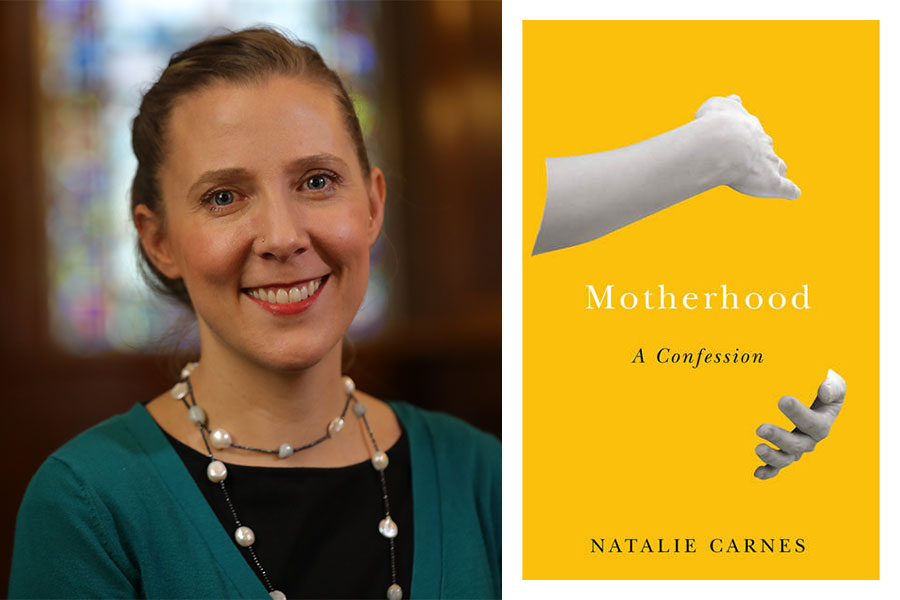Natalie Carnes
Motherhood: A Confession (Stanford University Press, 2020)
Natalie Carnes is Professor of Theology in the Department of Religion at Baylor University, where she teaches feminist theology and religion classes. She has published two books, most recently Image and Presence (Stanford, 2017), and multiple articles and online essays, including pieces on Pope Rihanna and nursing Madonnas. She lives in Waco, Texas, with her three daughters, two cats, and one husband.
Editorial Reviews
"This book pulls you in and leaves you better for having read it. Natalie Carnes's meditations on her experience are vulnerable and relatable, yet she gives us so much more than merely another Christian 'mom book.' Rich with insights from iconography, scriptural exegesis, and the Church fathers, her work as a mother, a stunningly gifted writer, and a thoughtful theologian combine to give us a gem of a book that often left me in tears. The beating heart of Motherhood: A Confession is the power of a mother's love, and Carnes's luminous examination of that love's complexities, contradictions, and grace drew me into wonder and worship. This is a rare book, one that combines profound theological depth with astonishing beauty. As Augustine's own Confessions would say, Tolle lege. Take up, read, and savor this book." -- Tish Harrison Warren ― author of Liturgy of the Ordinary: Sacred Practices in Everyday Life
"Natalie Carnes has written a beautiful companion and challenge to Augustine's Confessions. This book will be a gift to those hungry for literature that reflects the truth of women's relationship to the divine in our creaturely bodies and a theology of motherhood that reflects lived experience." -- Jessica Mesman ― author of Love & Salt: A Spiritual Friendship in Letters
"Natalie Carnes' remarkable meditation on motherhood, in conversation with Augustine's Confessions, is destined to become a classic itself. Her prose is vivid; her insight is penetrating; her honesty is disarming. This is a book that has been waiting 1,600 years to be birthed. Carnes has brought forth a masterpiece." -- James K.A. Smith ― author of On the Road with Saint Augustine
"Parenting can feel terrifyingly lonely, in part because it conjures emotions wholly unique to the endeavor. Natalie Carnes reflects on her own motherhood in this moving memoir alongside the progenitor of the genre, Augustine's Confessions―a risky undertaking, but accomplished brilliantly. Motherhood is a book to be savored." -- Tony Jones ― author of Did God Kill Jesus? Searching for Love in History's Most Famous Execution
"This brave, earnest book brings to the contemporary literature on motherhood a new, distinctively religious voice." -- Clare Carlisle ― Times Literary Supplement
"Imitating the voice, form, and tone of theConfessions,Natalie Carnes invokes Augustine as interlocutor, honoring the text's literary and moral merits while challenging the blind spots inherent in its masculine perspective. In so doing, she enriches our understanding of human nature and the nature of the divine, revealed in the intimacy exchanged between mother and child." -- Catherine Ricketts ― Ploughshares
From the Back Cover
A meditation on the conversions, betrayals, and divine revelations of motherhood.
What if Augustine's Confessions had been written not by a man, but by a mother? How might her tales of desire, temptation, and transformation differ from his? In this memoir, Natalie Carnes describes giving birth to a daughter and beginning a story of conversion strikingly unlike Augustine's—even as his journey becomes a surprising companion to her own.
The challenges Carnes recounts will be familiar to many parents. She wonders what and how much she should ask her daughter to suffer in resisting racism, patriarchy, and injustice. She wrestles with an impulse to compel her child to flourish, and reflects on what this desire reveals about human freedom. She negotiates the conflicting demands of a religiously divided home, a working motherhood, and a variety of social expectations, and traces the hopes and anxieties such negotiations expose. The demands of motherhood continually open for her new modes of reflection about deep Christian commitments and age-old human questions.
Addressing first her child and then her God, Carnes narrates how a child she once held within her body grows increasingly separate, provoking painful but generative change. Having given birth, she finds that she herself is reborn.
